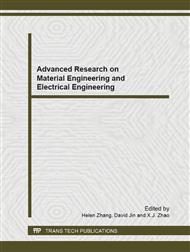p.227
p.231
p.235
p.242
p.246
p.251
p.255
p.260
p.265
Optimal Dispatching of Electrical Sensors for Automatic Control
Abstract:
In this paper, we consider an electrical sensor dispatching problem for automatic control systems(ACS). We propose an algorithm which selects one (or a group of) electrical sensor at each time from a set of electrical sensors. Then, the automatic control prediction algorithm computes the estimates of the continuous state and the discrete state of the ACS based on the observation from the selected electrical sensors. As the electrical sensor dispatching algorithm is designed such that the Bayesian decision risk is minimized, the true discrete state can be better identified. At the same time, the continuous state prediction performance of the proposed algorithm is better than that of automatic control prediction algorithms using only predetermined electrical sensors. Finally, our algorithm is validated though an illustrative target tracking example.
Info:
Periodical:
Pages:
246-250
DOI:
Citation:
Online since:
March 2013
Authors:
Price:
Сopyright:
© 2013 Trans Tech Publications Ltd. All Rights Reserved
Share:
Citation:


